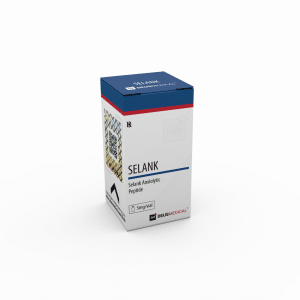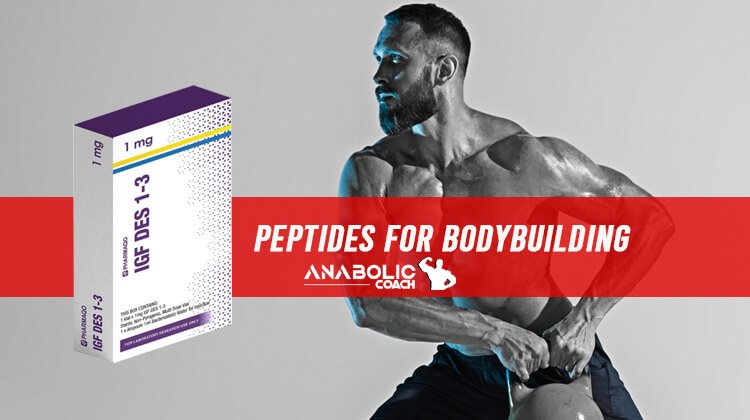Peptides have gained widespread acceptance as a useful tool for improving athletic performance in the world of bodybuilding. One particular type of peptide known as growth hormone secretagogues (GHS) have garnered a lot of attention in recent times.
Bodybuilders are athletes that frequently try to make changes to their physique in the shortest amount of time.
That’s why so many people use pills and other tricks to get the results they want from their workouts and their bodies.
Peptides are lauded for their ability to help bodybuilders gain muscle, burn fat, and maximize their workouts, and are typically seen as a safer alternative to performance enhancing steroids
This article discusses peptides for bodybuilding, covering topics such as their effectiveness and safety.
What are Peptides for Bodybuilding?
Peptides, such as GHSs, are made up of a chain of amino acids, the fundamental units of proteins and peptides.
Your body produces peptides, and you can also get them from foods like meat, fish, dairy, eggs, beans, lentils, and whole grains that are high in protein. These peptides can be purchased from manufacturers or synthesized by mixing amino acids.
Peptides share structural similarities with endogenous substances including hormones and signaling molecules. Some can even break beyond biological barriers.
These amino acid chains have important roles in your body, including hormone and DNA synthesis. They are popular among bodybuilders because of their usefulness in constructing muscular tissue.
Peptide supplements are available in the form of a powder that can be dissolved in water or anotherf beverage before being taken orally. You can also get them in an injectable version.
Peptides are naturally occurring chains of amino acids found in many foods and in the human body. They can be synthesized intentionally or extracted from their natural sources. These supplements are available for oral consumption as well as intramuscular injection.

How Peptides work for Muscle Mass?
Peptides, which can have a structure similar to that of hormones and other messaging molecules in the body, can interact with and activate several receptors, allowing them to exert widespread control over a wide range of physiological processes.
Certain peptides, depending on their sequence and composition, have the potential to lower cholesterol, inflammation, and blood pressure, as well as prevent blood clots, stimulate the immune system, and protect cells from damage.
Peptides for muscle mass have been shown to increase the production of hormones that promote muscle development, fat reduction, and enhanced performance and recovery following a HIIT workout session. Since bodybuilders want to get the most out of their workouts, this is a major selling point for them.
IN SUMMARY:
In the body, peptides interact with and stimulate a wide variety of receptors. The hormones and other signaling chemicals that are stimulated in this way may have an effect on your health, body composition, exercise performance, and recuperation.
Can Peptides be good for Bodybuilding?
Most bodybuilders want to make as few sacrifices as possible in the sake of transformation. Studies have shown that some peptides can assist people accomplish this.
Bodybuilders have a special interest in a class of peptides known as growth hormone secretagogues (GHS) due to their ability to increase natural HGH synthesis (HGH).
The pituitary gland produces human growth hormone. It can improve weight loss and speed up the process of building muscle.
One way it accomplishes this is by inducing the production of insulin-like growth factor-1 in the liver (IGF-1). In this manner, IGF-1 promotes muscle protein synthesis and subsequent muscular growth. It may also aid in fat loss by working indirectly.
In the 1980s, HGH was widely used by professional and amateur athletes, particularly bodybuilders, to improve their performance.
However, since 1989, regulatory authorities such as the International Olympic Committee have prohibited the off-label use of HGH due to safety concerns.
Many feel GHSs provide similar benefits to HGH with less negative consequences. This may account for their acceptance among bodybuilders who prefer not to use HGH.
As of now, studies show that GHS causes humans to produce more growth hormone (HGH) and insulin-like growth factor (IGF-1). However, few research have looked at whether or whether GHS genuinely improves body composition, exercise performance, or recuperation.
Furthermore, the impact of GHSs on trained individuals has not been studied.
So, more study is required to see if there are any real benefits to using GHSs for bodybuilders. Because of this, researchers have yet to determine which muscle areas peptides would affect the most, or which exercises would be most beneficial for maximizing their effects.
IN SUMMARY:
Growth hormone secretagogues (GHS) are a class of peptides that have emerged as a popular alternative to HGH among bodybuilders (HGH). However, research into the efficacy of GHSs for muscle development is lacking.

Peptides Types
As mentioned already, the group of peptides, called growth hormone secretagogues, are of special interest to bodybuilders (GHS).
Bodybuilders commonly use GHSs like:
- Hormones that stimulate the release of growth hormone include sermorelin, tesamorelin, CJC-1295 and CJC-1293.
- Ghrelin and compounds that behave like it, such as; anamorelin, lenomorelin, tabimorelin, ipamorelin and macimorelin.
- Alexamorelin, GHRP-1, GHRP-2, GHRP-3, GHRP-4, GHRP-5, GHRP-6, and hexarelin are all growth hormone-releasing peptides (GHRPs) that many bodybuilders crave.
All of these peptides, in the end, work to increase HGH production and secretion, albeit they may do so in slightly different ways.
Manufacturers will push each category for their own unique reasons.
To date, however, there has been no research conducted on the effects of GHSs in highly trained athletes like bodybuilders.
Therefore, anecdotal evidence is frequently used instead of scientific data for determining indications and suggested dosages.
IN SUMMARY:
GHS peptides can potentially promote muscle growth and body fat loss by increasing HGH secretion. Despite peptides’ present popularity among bodybuilders, additional research is needed to understand whether they help.
What are the Precautions to Take While on Peptides
It is unclear, from the available information, whether or not taking GHSs is safe in the short or long term. Unfortunately, the studies conducted so far on their safety have been both very little and brief. For this reason, there needs to be a lot more study done to determine if GHS is 100% safe.
Increased hunger, high blood sugar, and fluid retention are some adverse effects of GHS use. GHSs may also reduce insulin sensitivity, making it more challenging to maintain healthy blood sugar levels.
Non-sterile needles may also provide a contamination risk if used to inject GHS.
To this present day, the FDA has only approved a small number of GHS for the treatment of certain medical problems. As of right now, GHSs are also banned by the World Anti-Doping Agency.
Despite this, many GHSs may be bought without a prescription via supplement selling websites.
There is little information on their safety over the long term, and it’s nearly impossible to tell whether or not a supplement you buy is of good quality. Because of these risks, GHSs should never be used for purposes other than those approved by the FDA with a doctor’s prescription.
IN SUMMARY:
Depending on the individual, GHS peptides may cause an increase in hunger, glucose, or fluid retention. Their off-label use raises safety concerns, and it is difficult to know how safe they are in the long run.

Concluding Remarks
The muscle-building, fat-burning, and training performance and recovery benefits of peptides are frequently touted by supplement manufacturers.
However, many of these assertions lack substantial research support. Very little research has been conducted on the impact of peptides in highly trained individuals such as bodybuilders.
Furthermore, GHS peptides are now forbidden as a doping substance in competitive sports, and their long-term safety is still mostly unknown. They are only safe for use to treat a limited number of conditions, and their usage is not without risk.
In light of the foregoing, it is not advised that bodybuilders use GHS peptides for purposes other than those approved by the Food and Drug Administration.


